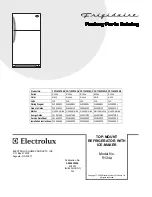
Defrosting
During use and when the door is opened, moisture is deposited as
frost inside the appliance, particularly on the evaporator melts. This
frost must be removed from time to time using the soft plastic scraper
supplied. Under no circumstances use hard or pointed objects for this
purpose.
The freezer should always be defrosted when the layer of frost has
reached a thickness of approx. 4 millimetres. Defrost should be carried
out once a year regardless of the amount of frost that has built up. A
good time for defrosting is when the appliance is empty or contains
only little food.
Each temperature rise reduces the keeping qualities of your frozen
food. Around 12 hours before defrosting your freezer, switch over to
fast freeze to build up a low temperature reserve in the frozen food.
Warning!
• Do not use electrical heating appliances or any other mechanical or
artificial devices to speed up the defrosting process.
• Do not use defrosting sprays, they can be hazardous to your health
and/or contain substances that damage plastics.
Caution!
Do not touch frozen food with wet hands. Your hands could
stick to the food and can cause skin abrasions.
Remove frozen food, wrap it in several layers of newspaper and store
it, covered, in a cool place.
Switch off the appliance and unplug it, or pull the fuse or switch off
the circuit breaker.
Remove all drawers except the bottom one. The bottom drawer serves
as a practical container to collect the water from the thawing ice.
Tip:
To speed up the defrosting process, place a pan with warm water
in the appliance and close the door. Remove pieces of ice that have
fallen before they completely defrost.
Remove the bottom drawer and dry the interior of the bottom com-
partment thoroughly.
After defrosting, thoroughly clean the freezer compartment and inte-
rior fittings ( see "Cleaning and Care" section).
☞
☞
☞
☞
☞
☞
23










































